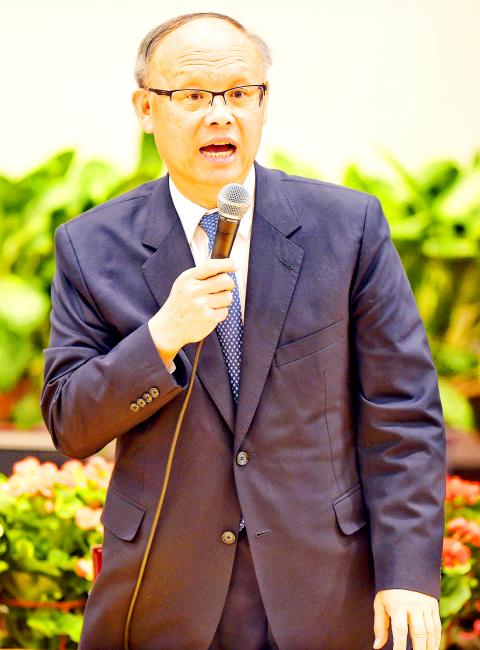Minister Without Portfolio John Deng (鄧振中), the nation’s top trade negotiator, yesterday said Taiwanese firms’ practice of exporting to the US products made of steel and aluminum from China was the reason that Taiwan has not been exempted from tariffs announced by Washington.
Deng, who is returning to Taiwan after leading a delegation to the US on Sunday last week to seek a tariff exemption, made the remark in a telephone interview with the Central News Agency.
The nation’s unsuccessful attempt to be included in the list of exemptions reflected Washington’s concerns that some Taiwanese firms import steel and aluminum from China and process them into finished goods before selling them to the US market, Deng said.

Photo: Chang Chia-ming, Taipei Times
US President Donald Trump’s tariffs seem to be aimed at curbing alleged dumping of Chinese steel and aluminum products in the US, he said.
Washington might be hoping to work with other nations to stop this situation, he added.
Deng said that after returning to Taiwan early today, he would meet with local exporters to map out a solution.
Despite the setback, he said the government would continue to try to convince the US to exempt Taiwan as a whole, while encouraging individual exporters to seek their own exemption.
The Ministry of Economic Affairs would provide assistance to individual firms that wish to seek an exemption, he added.
The temporary exemption list would not take effect until a formal notice is released by the end of next month, Deng said, adding that Washington welcomes other nations to enter into talks with its trade office for an exemption.
On March 8, Trump signed an order under Section 232 of the US’ Trade Expansion Act of 1962 to impose a 25 percent tariff on imported steel and a 10 percent tariff on aluminum.
The duties took effect on Friday.
It was the first time in more than three decades that the law has been invoked to protect a US industry from competition from imports.
On Friday, US Trade Representative Robert Lighthizer told a US Senate panel that Trump has decided to grant a temporary exemption to the EU, Canada, Mexico, Australia, Brazil, Argentina and South Korea as it carries out further negotiations with them.
However, the order signed by Trump leaves open a door to other nations that want to get tariff waivers, as long as they are able to offer a satisfactory alternative during talks with the Office of the US Trade Representative.
While in the US, Deng met with many US government officials and academics from major think tanks, as well as representatives from the business sector, which he said helped him gain a better understanding about the tariff issue.
Deng said he would report to Premier William Lai (賴清德) as soon as possible to discuss whether he will lead another delegation to Washington.
Taiwan’s steel product exports to the US totaled US$1.3 billion last year, accounting for 13.16 percent of the nation’s total exports, while aluminum product exports totaled US$44 million, or 6.15 percent of total aluminum exports, the ministry said
Last year, the US was the largest buyer of the nation’s steel products and the sixth-largest buyer of aluminum products, it said.

SECURITY: As China is ‘reshaping’ Hong Kong’s population, Taiwan must raise the eligibility threshold for applications from Hong Kongers, Chiu Chui-cheng said When Hong Kong and Macau citizens apply for residency in Taiwan, it would be under a new category that includes a “national security observation period,” Mainland Affairs Council (MAC) Minister Chiu Chui-cheng (邱垂正) said yesterday. President William Lai (賴清德) on March 13 announced 17 strategies to counter China’s aggression toward Taiwan, including incorporating national security considerations into the review process for residency applications from Hong Kong and Macau citizens. The situation in Hong Kong is constantly changing, Chiu said to media yesterday on the sidelines of the Taipei Technology Run hosted by the Taipei Neihu Technology Park Development Association. With

CARROT AND STICK: While unrelenting in its military threats, China attracted nearly 40,000 Taiwanese to over 400 business events last year Nearly 40,000 Taiwanese last year joined industry events in China, such as conferences and trade fairs, supported by the Chinese government, a study showed yesterday, as Beijing ramps up a charm offensive toward Taipei alongside military pressure. China has long taken a carrot-and-stick approach to Taiwan, threatening it with the prospect of military action while reaching out to those it believes are amenable to Beijing’s point of view. Taiwanese security officials are wary of what they see as Beijing’s influence campaigns to sway public opinion after Taipei and Beijing gradually resumed travel links halted by the COVID-19 pandemic, but the scale of

A US Marine Corps regiment equipped with Naval Strike Missiles (NSM) is set to participate in the upcoming Balikatan 25 exercise in the Luzon Strait, marking the system’s first-ever deployment in the Philippines. US and Philippine officials have separately confirmed that the Navy Marine Expeditionary Ship Interdiction System (NMESIS) — the mobile launch platform for the Naval Strike Missile — would take part in the joint exercise. The missiles are being deployed to “a strategic first island chain chokepoint” in the waters between Taiwan proper and the Philippines, US-based Naval News reported. “The Luzon Strait and Bashi Channel represent a critical access

Pope Francis is be laid to rest on Saturday after lying in state for three days in St Peter’s Basilica, where the faithful are expected to flock to pay their respects to history’s first Latin American pontiff. The cardinals met yesterday in the Vatican’s synod hall to chart the next steps before a conclave begins to choose Francis’ successor, as condolences poured in from around the world. According to current norms, the conclave must begin between May 5 and 10. The cardinals set the funeral for Saturday at 10am in St Peter’s Square, to be celebrated by the dean of the College